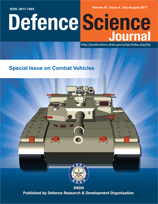Optimisation of Diesel Engine for Hybrid Military Tracked Vehicles using Matlab-Simulink
DOI:
https://doi.org/10.14429/dsj.67.11490Keywords:
Series hybrid, Diesel engine simulation, Simulink, GeneratorAbstract
The demand in the technology requirements for diesel engines is growing keeping hybrid vehicles in mind. In future the diesel engine no longer drives the wheels directly; as a result the engine can be engaged at a limited number of operating points, thus, offering an opportunity to optimise the fuel efficiency and performance at those operating points. The extent to which this optimisation is possible is limited by practical considerations. Also if the positive and negative power peaks in vehicle during mobility (e.g. acceleration and regenerative braking respectively) can be accommodated by high-power batteries, then the size of the engine can be considerably reduced. The engine’s operating points depend on the power-control strategy. The consequences of modifications to these operating points will have an effect on performance and efficiency. As in series hybrid only a limited number of operating points are involved and dynamic performance requirements are not imposed on the diesel engine, significant improvements can be achieved by the optimisation of the diesel engine at these operating points. The feasibility of optimisation of the engine at these operating points can be done by modification on the injection systems, the valve timings and other such parameters. This kind of approach requires the use of complex and repeated experimental analysis of the engine which is costly, cumbersome and time consuming. An alternative to this kind of experimental approach is to develop a simulation model of the engine with the generator in Matlab- Simulink.
Downloads
Additional Files
Published
How to Cite
Issue
Section
License
 Where otherwise noted, the Articles on this site are licensed under Creative Commons License: CC Attribution-Noncommercial-No Derivative Works 2.5 India
Where otherwise noted, the Articles on this site are licensed under Creative Commons License: CC Attribution-Noncommercial-No Derivative Works 2.5 India


